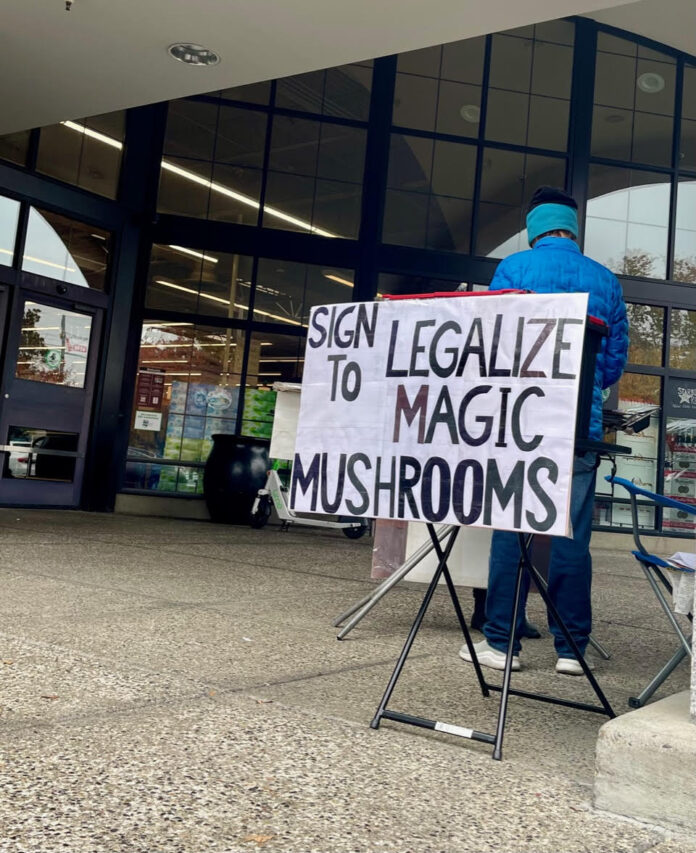
By Maxim Elramsisy, California Black Media
“I’m here today to tell you that psychedelic medicines represent the single most profound and important breakthrough in the treatment of mental health in our lifetimes,” said Dr. Nathaniel Mills, a Sacramento-based clinical psychologist at a Senate Public Safety Committee hearing for Senate Bill (SB) 58.
“Never in my 19 years of clinic has somebody said to me, ‘Dr. Mills: SSRI (Selective serotonin reuptake inhibitors) changed my life,’ but I’ve lost count of the number of times that people have come into my office and said, ‘Dr. Mills: I recently had an experience with a psychedelic, and I think that I’m cured,’” he added.
SB 58 was authored by Sen. Scott Weiner (D-San Francisco) and co-authored by several leaders of the California Black Legislative Caucus (CLBC). It aims to decriminalize the possession and personal use of plant and fungus-based psychedelics such as psilocybin, psilocyn, dimethyltryptamine (“DMT”), mescaline, and ibogaine – drugs that can cause temporary changes in consciousness and perception.
“These substances, in particular, are not addictive, and they show a lot of promise in helping people address mental health and addiction disorders,” Weiner said in an interview with California Black Media (CBM).
SB 58 has faced opposition from several organizations across the state, including law enforcement groups, the California District Attorneys Association (CDAA), and the California Contract Cities Association (CCCA).
“CDAA is concerned that making these drugs legal for recreational use, as opposed to strictly for research-related therapeutic use, is not grounded in scientific evidence about the dangers these drugs pose to individuals and communities,” read a statement from the group representing the state’s county prosecutors.
The bill’s authors argue that the “war on drugs” negatively impacted communities, particularly communities of color. “If criminalizing drug use stopped people from using drugs, we would have zero drug use in this country,” said Weiner, during a Senate Public Safety Committee hearing in March. “This bill means that people will no longer be arrested and prosecuted simply for possessing or using these drugs. This is about simple possession and use of these psychedelic substances.”
“This is not legalization, and setting up a legal market,” Weiner said to CBM. “That might happen in the future, but this is an initial step to say, step one, stop arresting and prosecuting people for possessing and using these substances, and then we can talk about the next steps.”
“We don’t have the power to change federal law, but we can remove California’s additional criminalization. It’s no different from cannabis. Cannabis is still scheduled under federal law, it’s completely illegal. But starting 27 years ago, California began to decriminalize, and then legalize cannabis so right now, it’s completely legal to buy to sell cannabis in California, but it’s illegal under federal law,” Weiner said.
Since 1970 the federal government has classified psychedelics, along with heroin and marijuana, as Schedule 1 controlled substances, a designation for drugs with no federally accepted medical purpose and a high potential of abuse. It was a political move by the Nixon administration backed by little evidence that ended federally funded scientific research into psychedelics, critics of the policy say.
The scheduling system continues to be challenged from both sides of the aisle, as thirty-eight states, three territories, and the District of Columbia, currently recognize and allow medical use of cannabis products, despite its schedule 1 designation.
Supporters point to research by private and foreign institutions showing health benefits for people suffering from medical conditions including substance use disorder (SUD), treatment-resistant depression, and post-traumatic stress disorder (PTSD).
The FDA previously granted “breakthrough therapy” status to MDMA and psilocybin for PTSD and depression respectively. A May 2022 letter from the Department of Health and Human Services, reported on by The Intercept, discusses the creation of a Federal Task Force “associated with the anticipated approval by the FDA of MDMA for the treatment of PTSD and psilocybin for the treatment of depression within approximately 24 months.”
Some Federal lawmakers are also trying to re-open the door for Psychedelic Assisted Therapy research. In March, U.S. Rep. Lou Correa (D-CA-46) announced the formation of a bipartisan Psychedelic Advancing Therapies (PATH) Caucus in the U.S. Congress.
“We are suffering from a mental health crisis in our Nation.” said Rep. Jack Bergman (R-MI-01), co-chair of the PATH Caucus. “Unfortunately, current medical interventions have proven inadequate and too often fail to help those in the greatest need.
Some veterans’ advocates point to high suicide rates among former servicemembers and the poor outcomes for current treatments as rationale for decriminalization.
“I’ve self-medicated. I’ve been in and out of therapy. I’ve tortured myself and my loved ones,” said Jason Moore Brown, an entrepreneur and combat veteran speaking in support of SB-58. “The sponsors of SB-58 sent me and six other veterans to a retreat center in Latin America where we had access to plant medicines not readily available, nor legal in the US.”
In a statement opposing the bill, CCCA wrote, “Ultimately, we feel that any potential health benefits associated with decriminalizing these drugs, many of which have been vastly understudied, do not outweigh public safety risks and local management issues that could detrimentally impact communities.”
Witnesses opposing the bill at the Public Safety Committee hearing acknowledged the potential positive medical uses for psychedelics but urged inclusion of additional provisions and guardrails.
Sen. Nancy Skinner (D-Berkeley), a co-author, voted in favor of advancing the bill out of the Public Safety Committee.
She stated, “I would like to see a bill that dealt with this in a therapeutic setting and provided some appropriate guidelines. I think what the author is trying to do right now is deal with the fact that it’s criminalized, and I think there has not been a benefit to its criminalization.”
Colorado, Michigan, and Massachusetts have passed legislation decriminalizing psilocybin in select municipalities. In 2020, Oregon decriminalized all drugs for personal use. In California, the cities of Oakland and Santa Cruz decriminalized psilocybin in 2019 and 2020 respectively.



